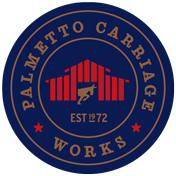Here at Palmetto Carriage Works, we are avid advocates for our main attraction and cutest employees, our animals. Our animals are essential to our daily routes and rides throughout historic Charleston, so we love to share the work and care that goes into having them in our barn. Most often, our visitors have questions about where we get our animals from, how many years they spend with us, what their stories are and how we train them. Keep on reading to get those answers!
Palmetto Carriage Works: Do the Palmetto Carriage Works animals go through any kind of training to get them used to the routes? What does that all entail?
Angie Arcangeli: The animals go through an extensive training program. They start at the farm where they work a minimum of five hours, but can increase as necessary. At this point, in the teams we figure out who pulls best on which side, their demeanors and if they know the basics of pulling. After they have passed step one, they come to town. In town, they will pull a minimum of 15 hours on an empty carriage with two of our skilled tour guides. This is where they will do all the routes, practice standing with our advertising carriages and go out of their way to encounter anything that may be new to the animals. We have an extensive checkoff sheet that will be completed to show that they can safely pass things that are a common occurance on the streets – umbrellas, strollers, motorcycles, buses, etc. Once the drivers feel comfortable with the animals, they move on to the final step. They will then do 20 hours with two drivers along with passengers. Once they have completed this step, they are part of the herd and will be scheduled to work as the rest of the animals do.
PCW: How many years do the animals spend at Palmetto Carriage Works?
AA: It honestly depends on the animal. We have some that will work only one season, then we have others that have been here for more than 12 years. Hit and Run are our longest running team, that have been working 15 years, along with with Milhouse for 12 years.
PCW: Why are some animals paired up while some pull the carriages by themselves?
AA: The animals pull single or in teams based on their weights. The animals have to be a certain weight in order for them to comply with city laws. We have some smaller teams that together weight over 2000 lbs., while we also have single horses that weigh that on their own.
PCW: Where do the PCW animals come from?
AA: The animals come from as far as New York to Indiana to Georgia. Tommy, our General Manager, has a lot of contacts across the country that regularly sell to us, along with regional auctions. The animals are bought year round, but the majority of our purchasing and training is done over the slower winter months.
PCW: How long does it take for the animals to be trained?
AA: The time varies from animal to animal, but our training program requires a minimum of 40 hours of city training. We will spend additional time training animals that have potential.
PCW: What is the hardest part of training the animals?
AA: The uncertainty of new animals; we often don’t know what they did in their previous life and what they may or may not have encountered. When an animal has mainly done farmwork, a firetruck can be a new sight they will have to get used to. Finding out whether or not they can adapt to this new life and react accordingly is very important. Often times the groundwork that is needed is part of the training as well. Making sure that the animals can become accustomed to grooming and shoeing is just as important as the driving. If we can’t keep them clean and with shoes on, they can’t do the work safely.
PCW: What is the best part of training the animals?
AA: Every time we get a new animal, we know nothing about them. In the training process, the animal gets a lot of one-on-one time, and learning about their personalities can be very rewarding. We want our drivers to know their personalities so they can form a better working bond.
PCW: Who trains the animals?
AA: We have a set of drivers that have been working at Palmetto Carriage Works for several years who regularly train the animals. All of the animals we get have been trained to, and have worked in, harnesses as well.
